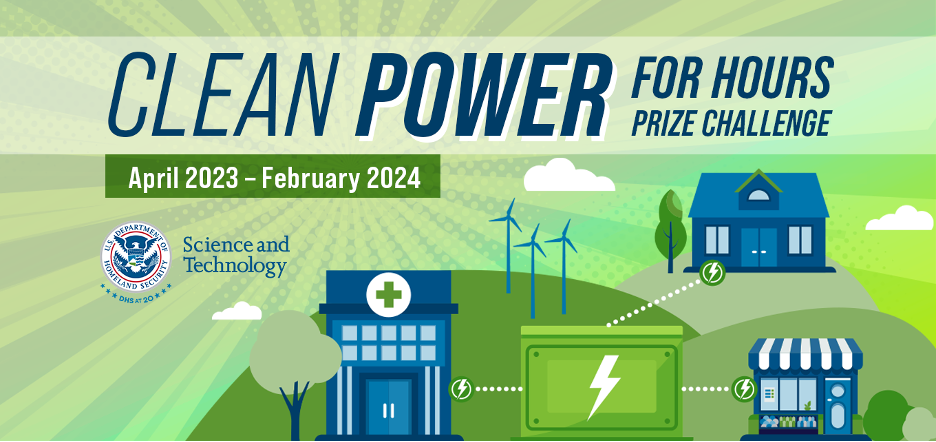.png)
Challenge Details
DHS-2023-106
DHS
TBD
TBD
Closed
N/A
No Attachments
To find out more information about this Challenge, please signin or register for an account.More Challenges
No additonal Challenges were found.

Clean Power for Hours Challenge
Challenge Summary
Description
Overview
How You Can Participate
Submission period:
Challenge type:
What We are Looking for:
This is particularly important to National Critical Functions (NCF) that support essential community lifelines services (basic needs like emergency services, urgent healthcare, and food/water).
These technologies also should be capable of working with on-site renewable power generation including alternative energy sources such as solar Photovoltaics (PV) arrays and small-scale wind power or operating as part of a virtual power plant or similar concept and be able to coordinate with other distributed energy resources.
This Challenge is part of the DHS effort to implement a proactive approach to climate change adaptation and resilience. This is the second in a series of DHS prize competitions to address hazards posed by climate change. This Challenge will support DHS’s mission on climate change resilience and adaptation, and work with the energy sector and other critical infrastructure owners and operators to find solutions for back-up power generation during a disaster.
The Reason Why:
Much goes into securing our critical infrastructure and understanding the impacts of climate change is a major consideration. One of the key components is ensuring that anchor institutions, or essential community service provider facilities continue to function even during a power disruption. Promoting national resilience against the many threats associated with climate change is a DHS priority. Climate change will increase the likelihood of power outages nationwide. Depending on what type of facilities experience a power outage, the implications of a power failure can endanger lives and safety of Americans. Critical facilities that support community essential services often rely solely on electricity for power and lack adequate on-site power generation and energy storage to operate during a power outage.
Fossil fuel-powered emergency (back-up) generators are the most commonly used solutions to supply backup power during facility power disruptions. Most fossil fuel-powered back-up generators run on gas, diesel, natural gas, or propane, all of which have debilitating effects on the climate, producing substantial greenhouse gas (GHG) emissions, environmental and noise pollution that impacts community public safety, health, and environmental security, and have fuel delivery and storage requirements that pose additional safety concerns, especially under extreme weather conditions. Battery-powered storage has emerged as an alternative to fossil fuel generators offering a variety of societal benefits such as reducing utility bill payments, storing energy from solar panels for later use, and providing back-up power during limited power disruptions. Significant issues exist with battery solutions such as supply-chain and manufacturing risks, reliability, cost, and end-of life considerations that may impact a stakeholders’ willingness or ability to deploy them, and energy storage capacity limitations (12-24 hours of backup power). This also includes:
• Reliance on foreign and volatile supply-chains for extraction of materials and manufacturing components and systems
• Safety and reliability concerns stemming from fire and explosion risks associated with these systems
• Stationary, energy storage systems that compete with rapidly growing electrified transportation sector for battery materials and components such as materials used in cells
• Emissions and waste produced over the lifetime of systems spanning from materials extraction through end-of-life disposal
• Non-ideal solution long duration storage (10+ hours) due to high cost or limited technical capacity with existing consumer battery-powered backup solutions.
These issues are especially acute for owners and operators that are responsible for providing and maintaining critical societal services. In addition, the U.S. will benefit from clean energy storage solutions that can overcome key challenges such as sourcing minerals and materials that are commonly available in the United States (U.S.) developing highly reliable systems that minimize safety concerns and align with decarbonization and emission reduction goals.
Important Dates to Keep in Mind:
Close to Submissions: You have until Tuesday, August 8, 2023 by 8:00 p.m. EDT (08/08/2023 08:00 PM EDT)
Finalists: We will announce the Finalists in August 2023
Prize Winners: We will announce Prize Winners in February 2024
(Dates are subject to change. We will announce changes on this website and through social media)
Prize Total:
Prize Phases:
Finalists
In Stage 1 the judges will choose up to fifteen Stage 1 Finalists to advance to Stage 2. Each Finalist will receive $10,000. Take a look at the submission guidelines, Challenge Rules, Stage 1 judging criteria and the two possible Use Cases. If you are chosen as a Finalist, you will automatically advance to Stage 2.
Prize Winners:
We will announce:
Grand prize winner: $400,000
Runner up winner: $200,000
Up to two Honorable mentions: $50,000
Non-monetary Prizes:
Point of Contact
Name
Challenge.gov
kcrim@defensewerx.org
Title
Not Provided
Phone
Not Provided